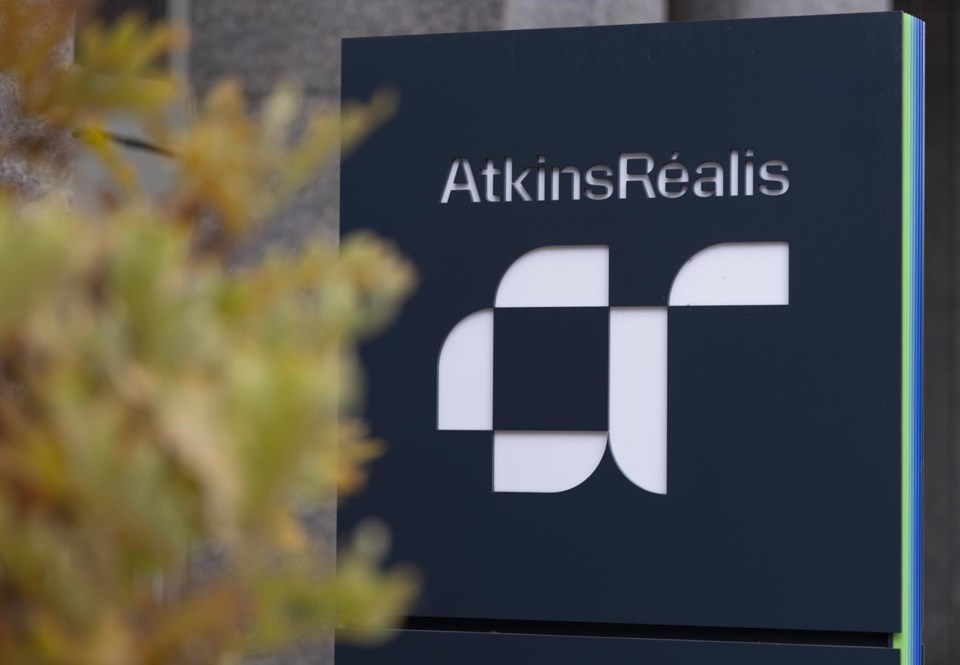MONTREAL — AtkinsRéalis enjoyed a thriving nuclear business in its latest quarter, as the engineering firm looks to build on a gradual global transition away from fossil fuels.
The company formerly known as SNC-Lavalin reported organic revenue growth of 21 per cent year over year in its nuclear segment, while its backlog of nuclear contracts rose by 87 per cent to $1.8 billion.
The bigger order book stemmed mainly from business linked to Atkins subsidiary Candu Energy over the past year.
Chief executive Ian Edwards pointed to the Ontario government's plan to build a new nuclear station at Bruce Power on the shores of Lake Huron, on top of the ongoing refurbishment of the Toronto-area Darlington nuclear plant.
"We are actively working on Candu life extensions at Darlington and Bruce Power," Edwards said on a conference call with analysts to discuss the company's first-quarter earnings Wednesday.
"And we continue to see growth opportunities in Ontario as the government recently announced a program to refurbish the Pickering nuclear power station."
With early work already underway, that project aims to extend the Pickering plant's life by 30 years and meet a projected surge in the province's electricity demand, the CEO said.
In November, the company announced that a Candu-led consortium snagged a $750-million engineering and procurement contract to extend the life of Romania's Cernavoda nuclear plant.
For 2024, Atkins now forecasts nuclear organic revenue growth of between 15 per cent and 20 per cent, up from earlier growth expectations of 12 to 15 per cent.
The company sees nuclear power as part of a broader shift to more sustainable energy production that it hopes to seize on across the globe.
"Australia, for example, is, like most countries, pivoting to energy transition work — that would be transmission-distribution work, that would be pumps, hydro storage, hydro projects," Edwards said, noting that Atkins is bidding on work there.
"The history of Australia is more about transportation; the future of Australia is about energy transition."
Nonetheless, transportation infrastructure remains a cornerstone of the company, as governments look to repair and rebuild aging roads, bridges and railways, particularly in the United States.
Edwards pointed to backlog growth fuelled by Georgia's transportation department as well as design and construction management for rail signalling in the United Kingdom last quarter.
"We have deep relationships with several departments of transportation across the U.S. and we are methodically increasing our foothold in high-growth city centres," he said.
On Wednesday, the company reported that first-quarter engineering services revenue rose 17 per cent year over year to $1.7 billion.
Atkins' net income attributable to shareholders jumped 60 per cent to $45.5 million, while total revenue increased 12 per cent to $2.26 billion in the three months ended March 31 from the same period a year earlier.
The Montreal-based company lost $13 million in earnings before interest and taxes on so-called lump-sum turnkey projects (LSTK) — fixed-price contracts under which firms must foot the bill for cost overruns. The total marked a bigger loss than the $9.2 million from the year before, but a smaller one than in years past.
Three of those contracts at Atkins continue to act as thorns in its side as Edwards looks for an eventual market exit: Toronto's Eglinton Crosstown light-rail transit system, Ottawa's Trillium Line and the greater Montreal area's REM light-rail network extension. While the first two are largely complete after years of delays and ballooning budgets, they have yet to open to the public amid ongoing commissioning and testing.
Atkins' backlog on lump-sum projects shrank by 42 per cent year over year to $299 million in its first quarter, mainly due to progress on the REM line, Edwards said.
He also reiterated Atkins' plan to sell its stake in Linxon, the firm's joint venture with Hitachi Energy.
"Frankly speaking, I think it's going to take a while to find the right partner," he said. "We've got to show performance in the business."
The outfit, which focuses on electrical substations, eked out $1.8 million in earnings before interest and taxes last quarter.
Meanwhile, adjusted earnings for Atkins' capital segment dropped 91 per cent year over year to $1.1 million due to a lack of dividends from its seven per cent stake in the Hwy. 407 toll road near Toronto.
On an adjusted basis, the company's diluted net income attributable to shareholders from professional services and project management rose 31 per cent to 42 cents per share, roughly on par with analysts' expectations, according to LSEG Data & Analytics.
This report by The Canadian Press was first published May 15, 2024.
Companies in this story: (TSX:ATRL)
Christopher Reynolds, The Canadian Press



